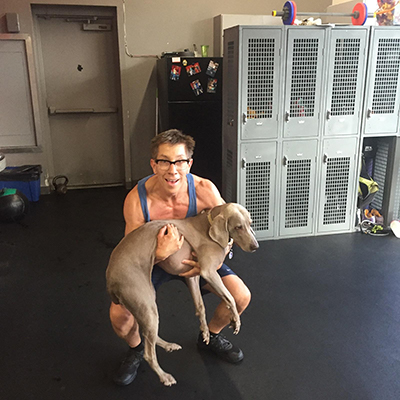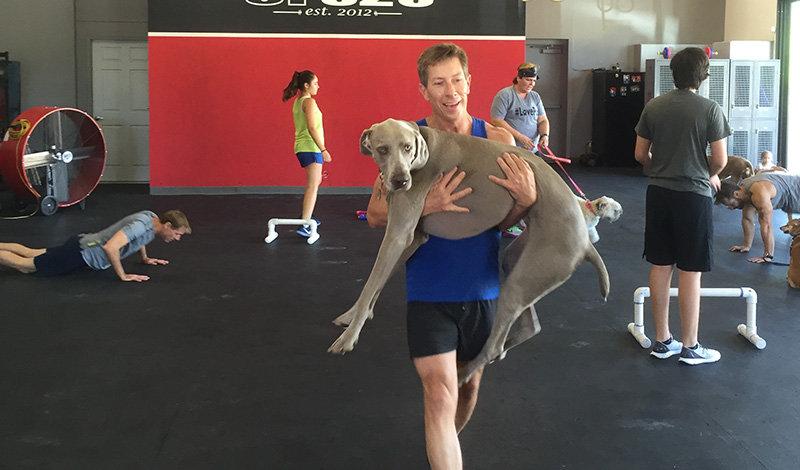I was enjoying my very busy life as a radiation oncologist, in a relationship, running, going to CrossFit daily, and taking care of three dogs, when my world changed with a simple blood test.
At 3:30 in the afternoon on July 9th, I saw my last new patient of 2013, and was admitted to the hospital at 8 am the next day. I was diagnosed with acute lymphoblastic leukemia with multiple critical issues. I was not permitted to leave the hospital for 23 days. It took a village to come to my aid, providing care for my menagerie of pets, including the dogs and two cats, taking care of my house and assuming the care of all of my patients.
While I was in the hospital, I was not able to see my dogs (okay, I snuck out to the sidewalk a couple times, our little secret). After discharge, caring for my dogs gave me the necessary motivation to move, after losing muscle and strength during my stay in the hospital.
During my battle with cancer, my dogs encouraged me to keep going. My biggest challenge came when I received a stem cell transplant from my brother’s bone marrow. A much more brutal treatment than my initial chemotherapy, it included whole-body radiation and even stronger chemotherapy. During this treatment, I was confined to one floor of the hospital, barely leaving my bed, using a central line for all food and fluids. Upon discharge, my dogs’ presence was immensely critical to me getting better.
The treatments that I endured left me very thin, and I felt cold all of the time. My dogs, making up for all of the attention they had missed during my illness, took every chance to pile on top of me which I was grateful for. They kept me warm.
I was so weak I could barely lift a grocery bag. I had so many people who helped me with the daily things I once used to do and took for granted, i.e. meal preparation, cleaning, shopping, etc. I, on the other hand, was a constant companion to my trusty four-legged friends, all of us being distracted only by an occasional nap. When it was time for a potty break they looked at me as if to say, “well, let’s go”! Their need to go out and get some exercise superseded my need to lay there in self-pity.
Fulfilling their needs helped me. In the beginning, it was only walking them, but it was a great place to start on my road to recovery. Continued walks lead to longer walks, and eventually back to running, and back to work, treating other cancer patients and helping them to get back to their lives. I got a little stronger every day, even stronger than I had been before my own cancer diagnosis.
A recent article published in HealthDay News, “Walking the Dog, All the Way to Better Health” reports that your dogs may be more than your furry companion, and that new research suggests that they may also be an effective personal trainer. Dog walkers spend less time sitting which means they are spending more time being physically active.
Project leader Andy Jones said “Physical activity interventions typically try and support people to be active by focusing on the benefits to themselves, but dog walking is also driven by the needs of the animal. Being driven by something other than our own needs might be a really potent motivator and we need to find ways of tapping into it when designing exercise interventions in the future.”
 In addition, studies have shown that owning a dog helps with your heart health by lowering anxiety, lowering blood pressure, reducing cholesterol, and decreasing triglyceride levels. A study in the journal Gerontologist found that older adults who walked dogs experienced “lower body mass index, fewer activities of daily living limitations, fewer doctor visits, and more frequent moderate and vigorous exercise.”
In addition, studies have shown that owning a dog helps with your heart health by lowering anxiety, lowering blood pressure, reducing cholesterol, and decreasing triglyceride levels. A study in the journal Gerontologist found that older adults who walked dogs experienced “lower body mass index, fewer activities of daily living limitations, fewer doctor visits, and more frequent moderate and vigorous exercise.”
Other studies tell us that dogs also help with making people less prone to depression, isolation and loneliness.
Despite all of the health benefits, owning a pet can be a big responsibility that doesn’t work for everyone. A good option might be to help out at one of the local animal shelters, all of whom desperately need volunteers to help with exercise and companionship while the animals there wait for a “furr-ever” home. A real win-win!
*Update: Check out Dr. Mack’s feature on the Bark & Wag podcast where he discusses how dogs can help you heal.
Sources:
- https://consumer.healthday.com/general-health-information-16/pets-and-health-news-531/walking-the-dog-all-the-way-to-better-health-724871.html
- Gerontologist. 2017 Oct 1;57(5):930-939. doi: 10.1093/geront/gnw051. https://www.ncbi.nlm.nih.gov/pubmed/27002004
- http://www.huffingtonpost.com/entry/the-10-health-benefits-of-dogs-and-one-health-risk_us_57dad1b8e4b04a1497b2f5a0
Author: Curtis Mack, MD is a Radiation Oncologist at Arizona Oncology. Dr. Mack is board certified in radiation oncology by the American Board of Radiology. He is active on the board of Handi-Dogs, a non-profit organization dedicated to training service and therapy dogs for seniors and those with disabilities in Southern Arizona.



